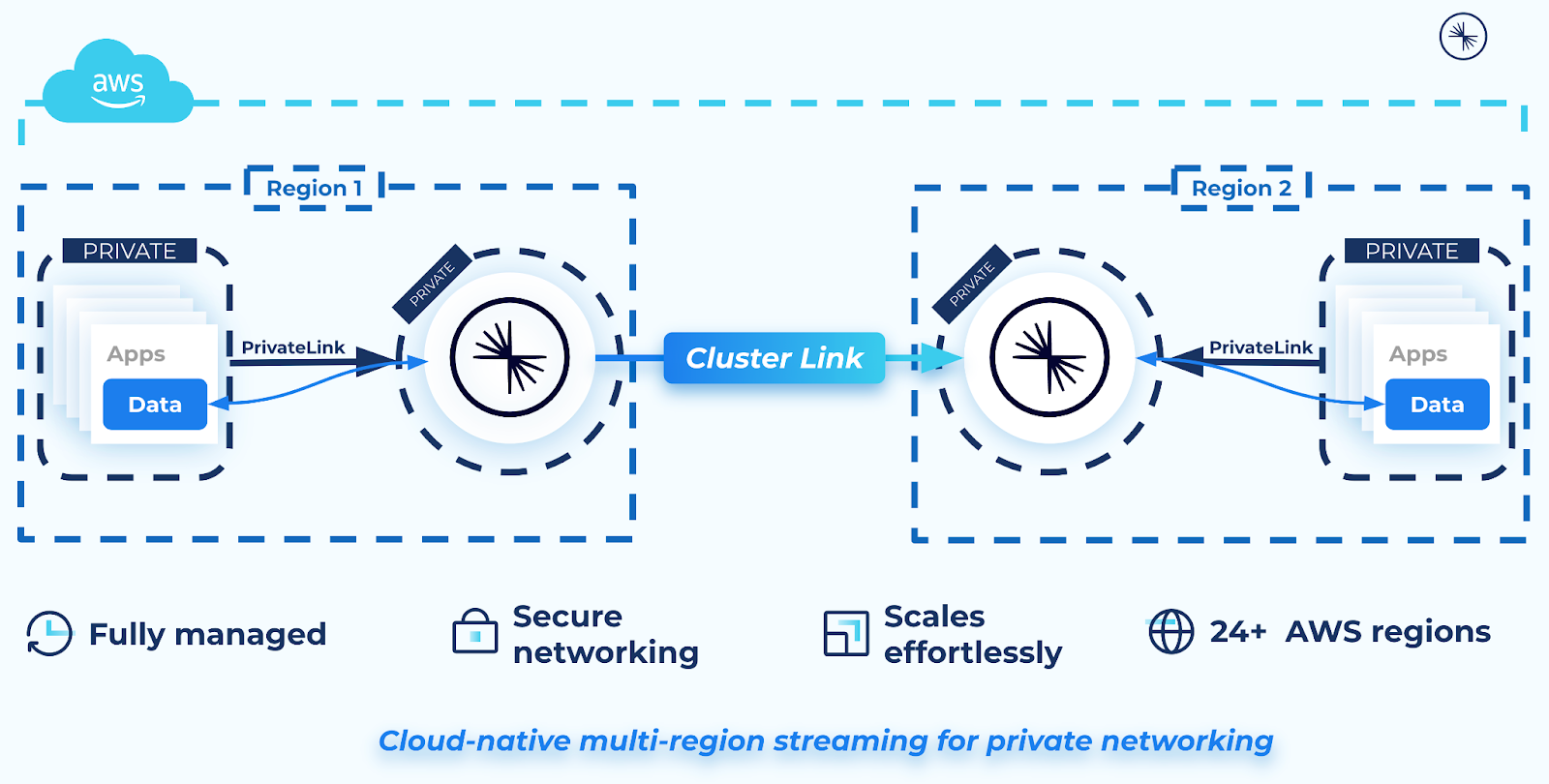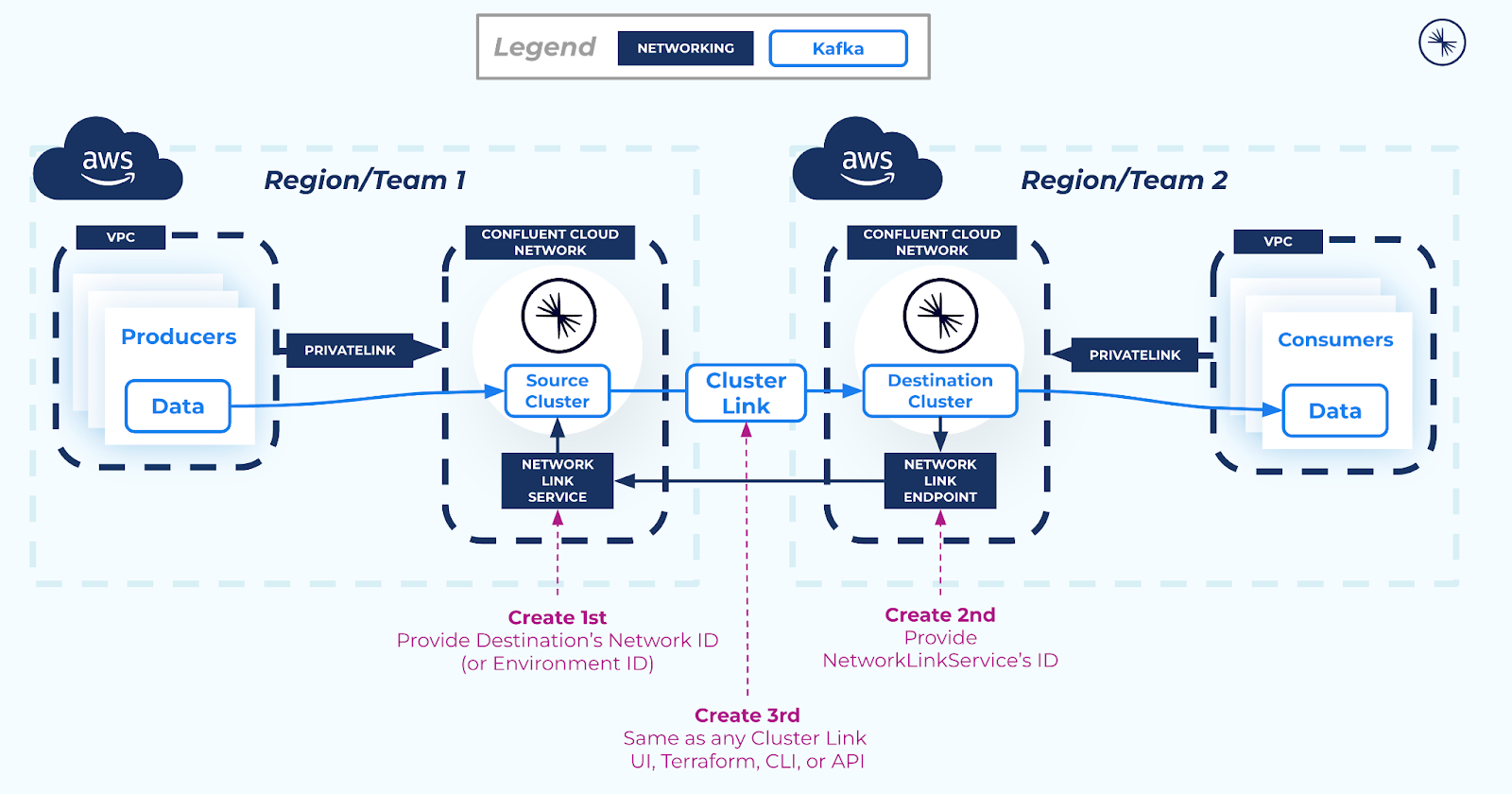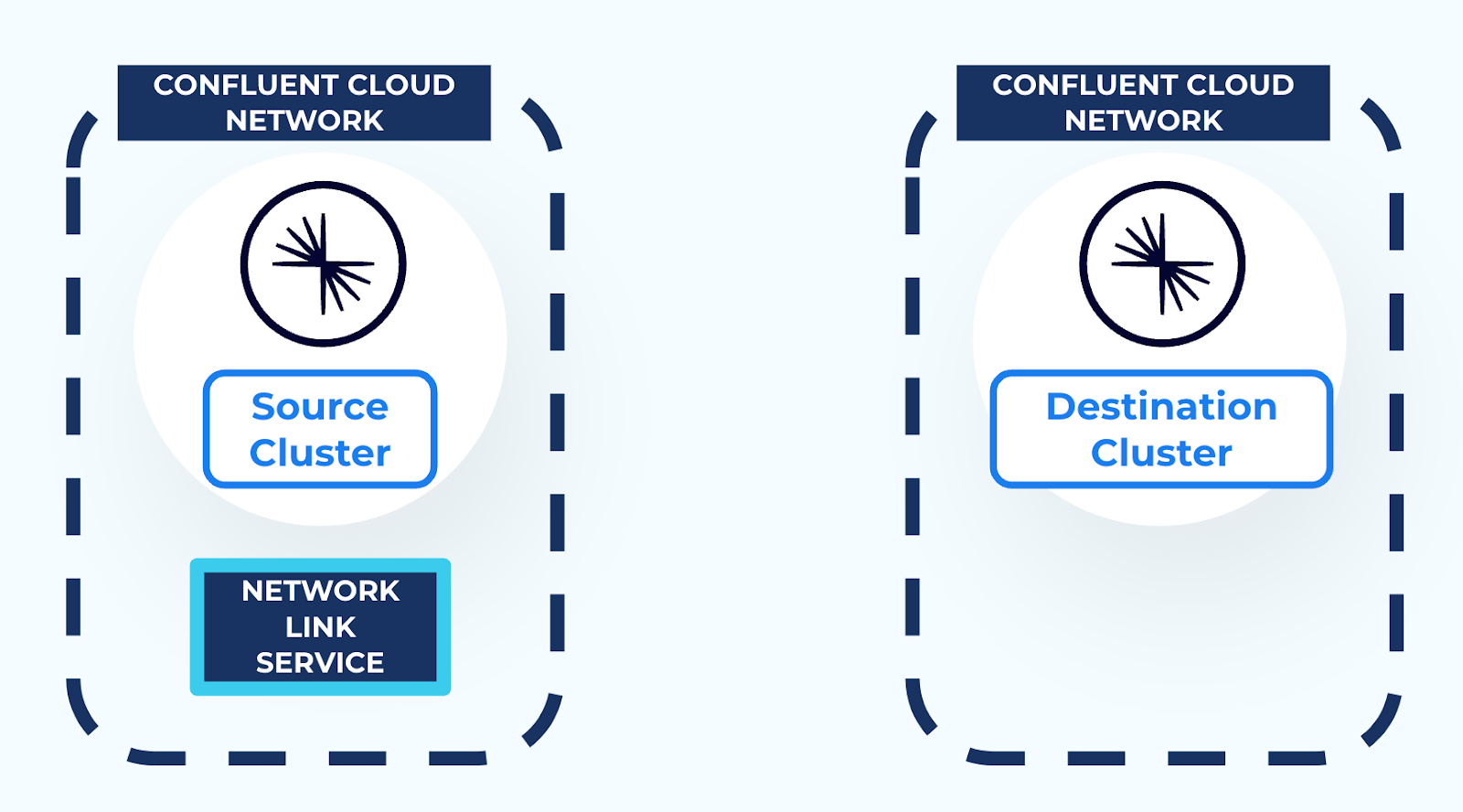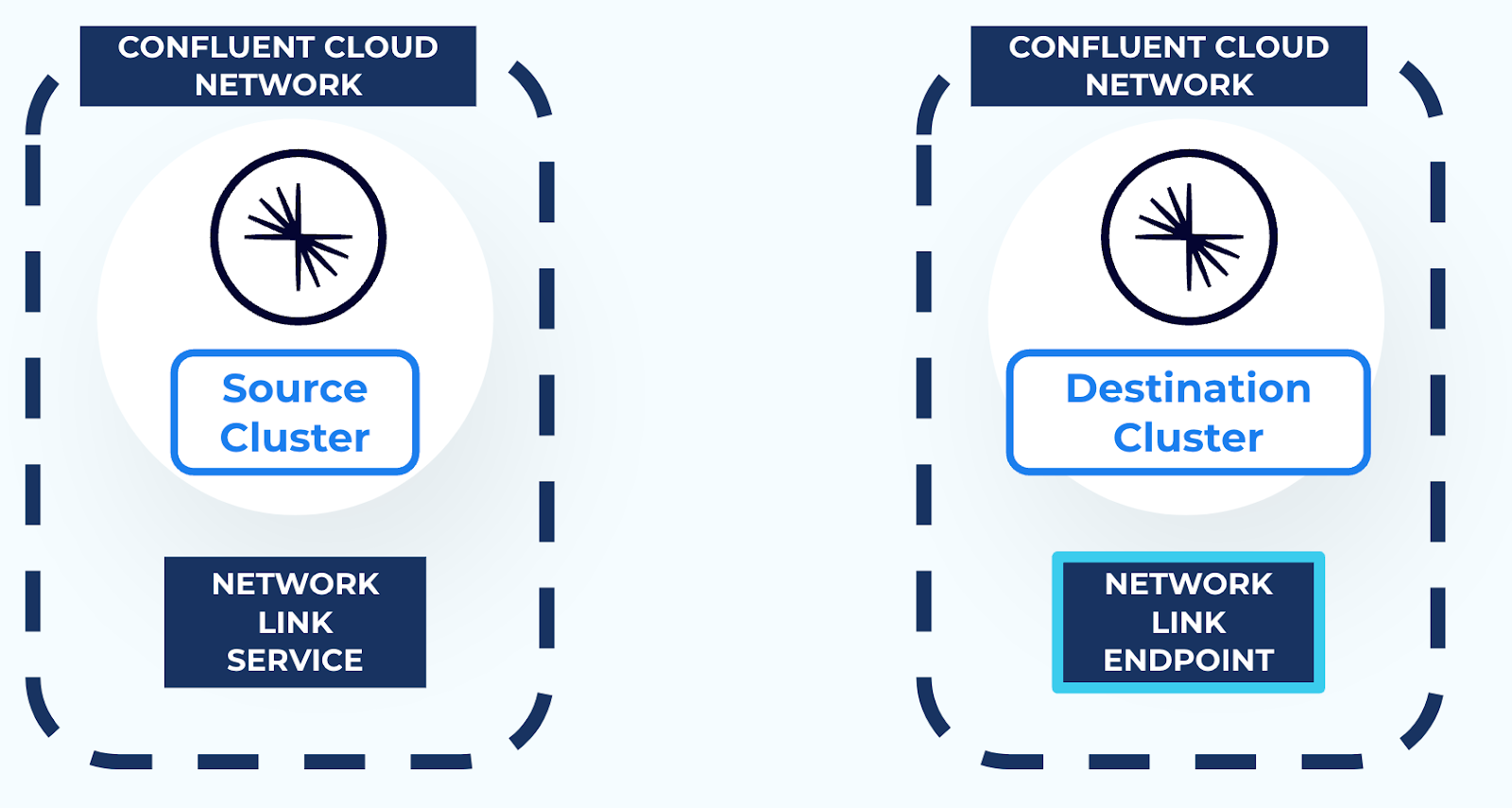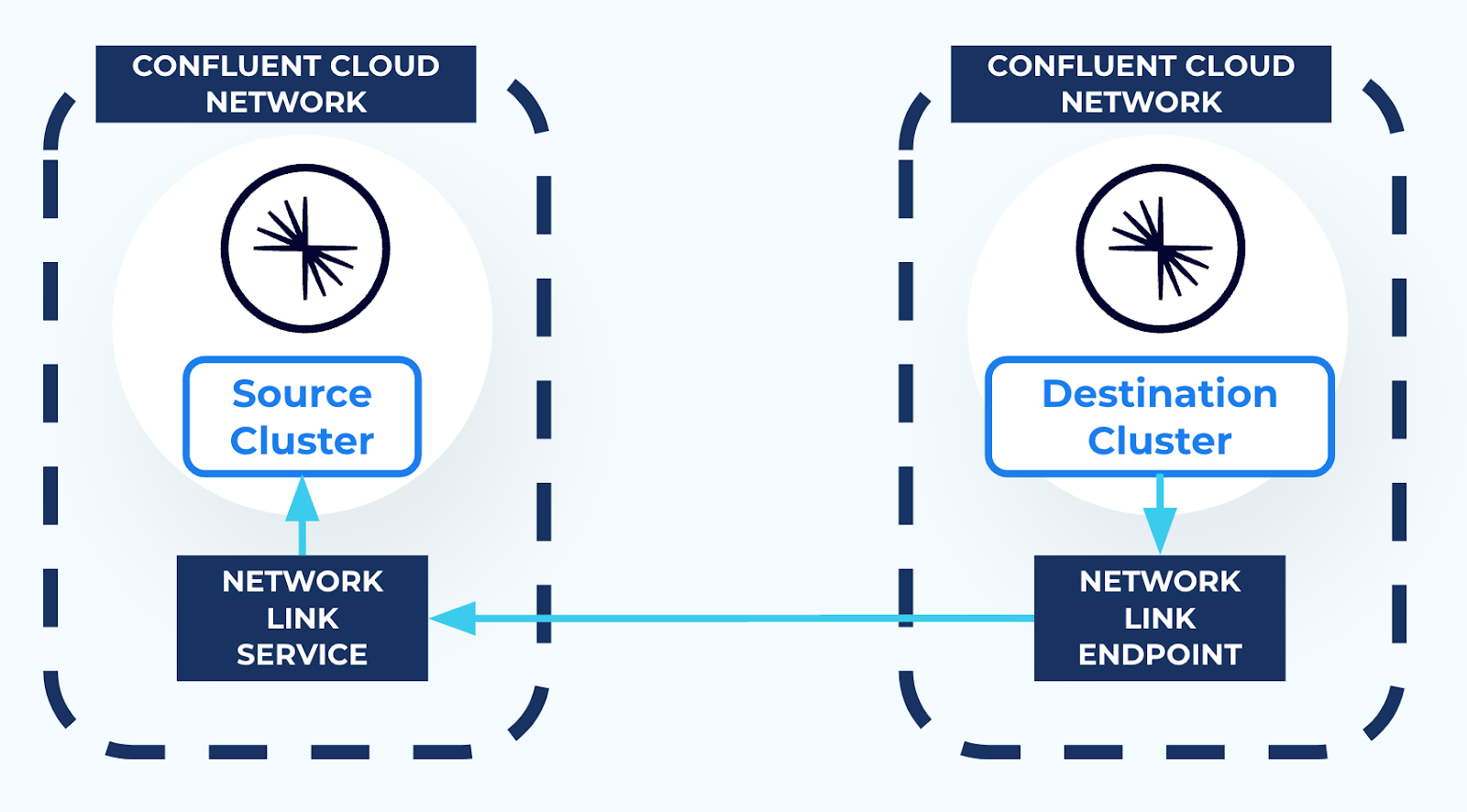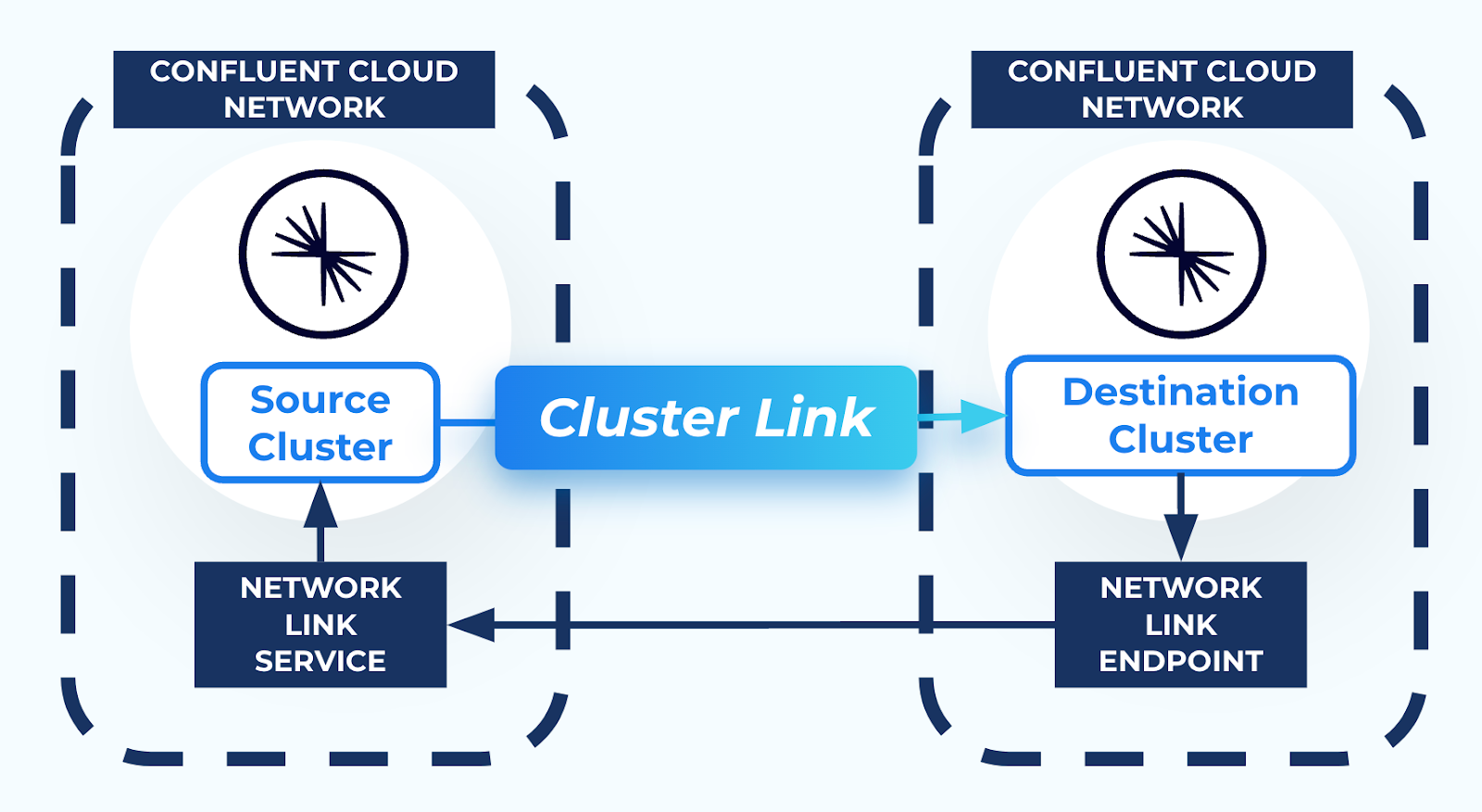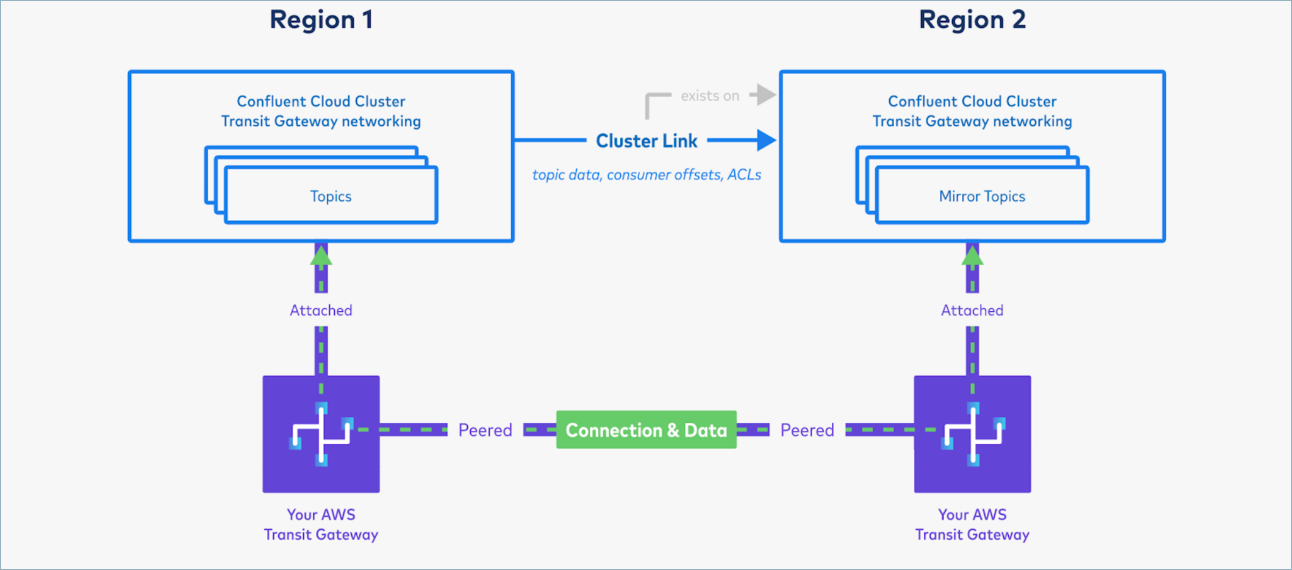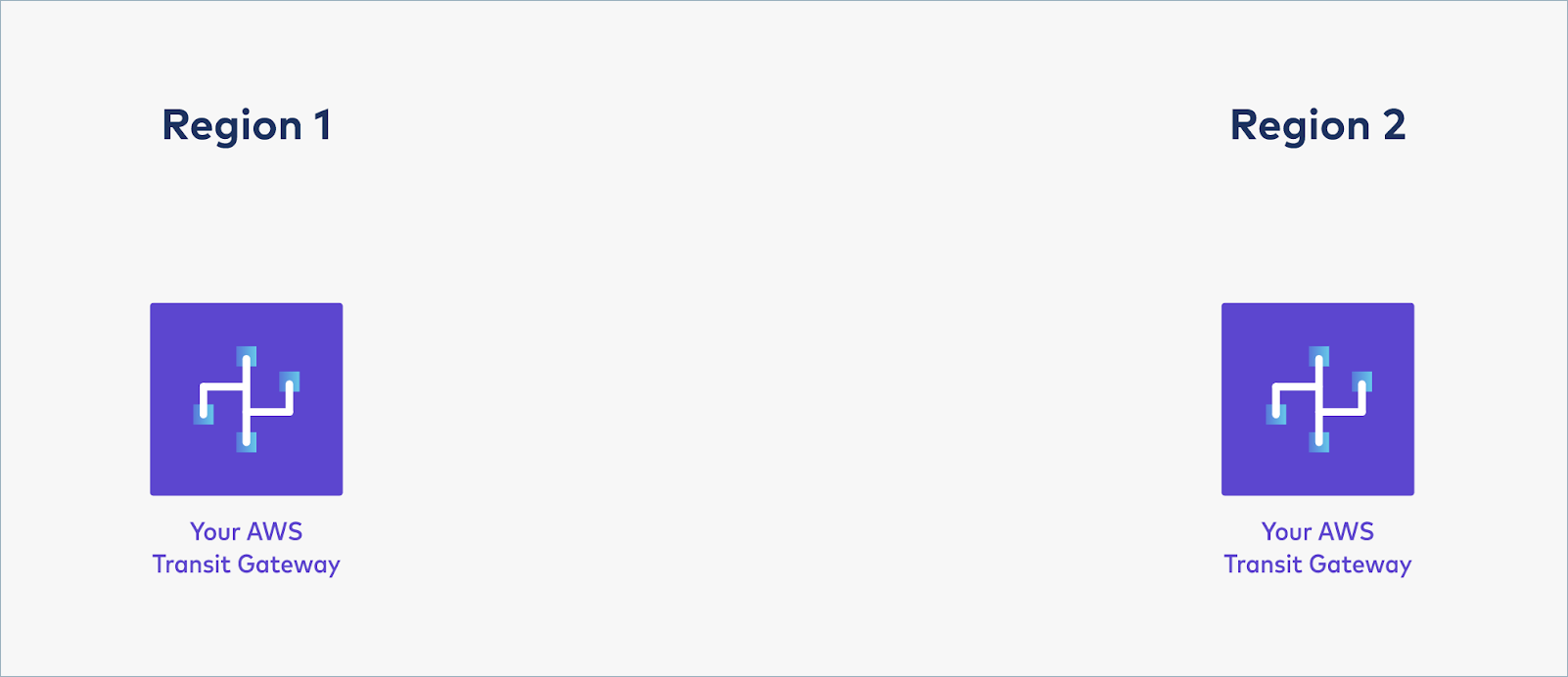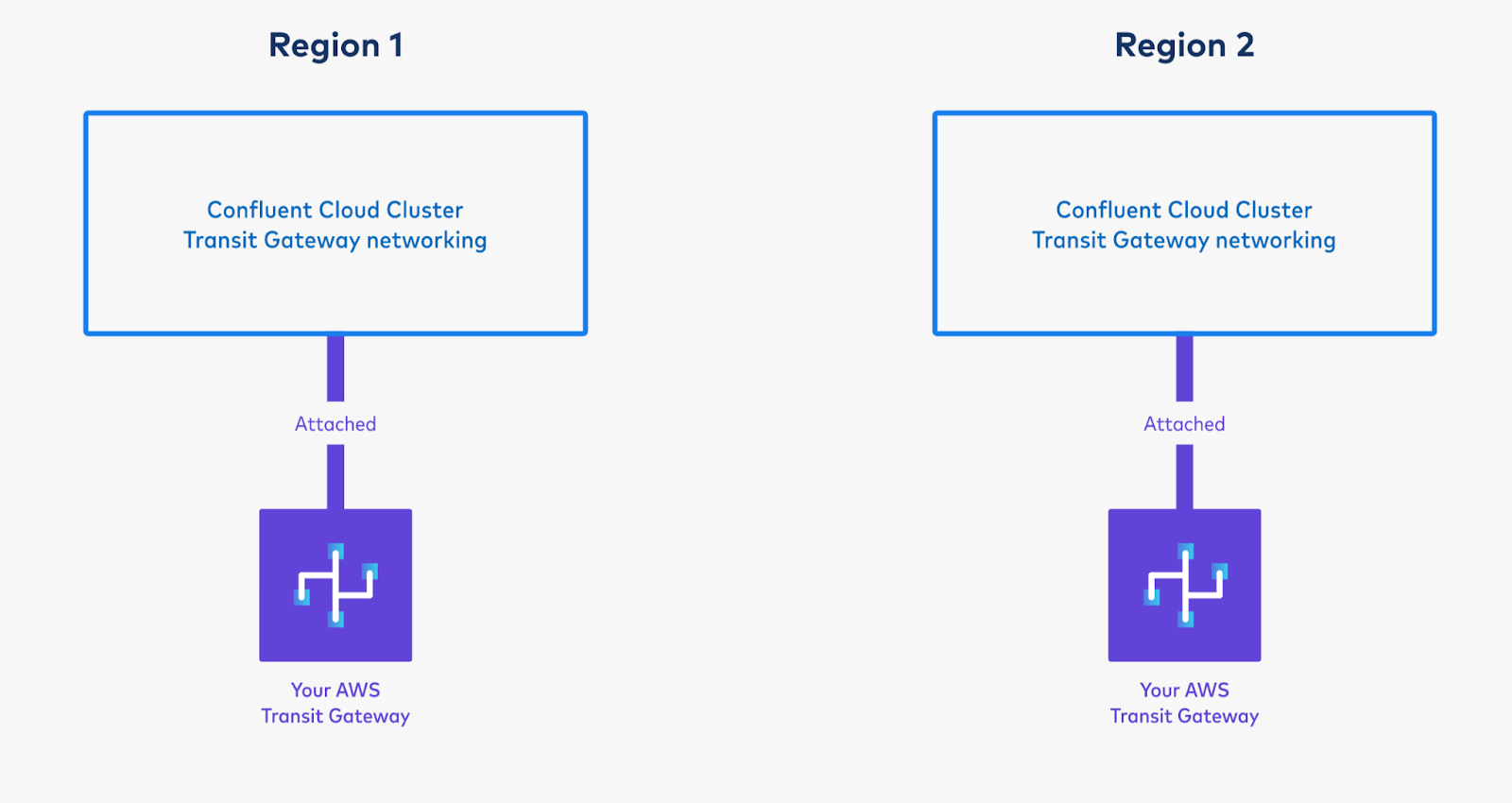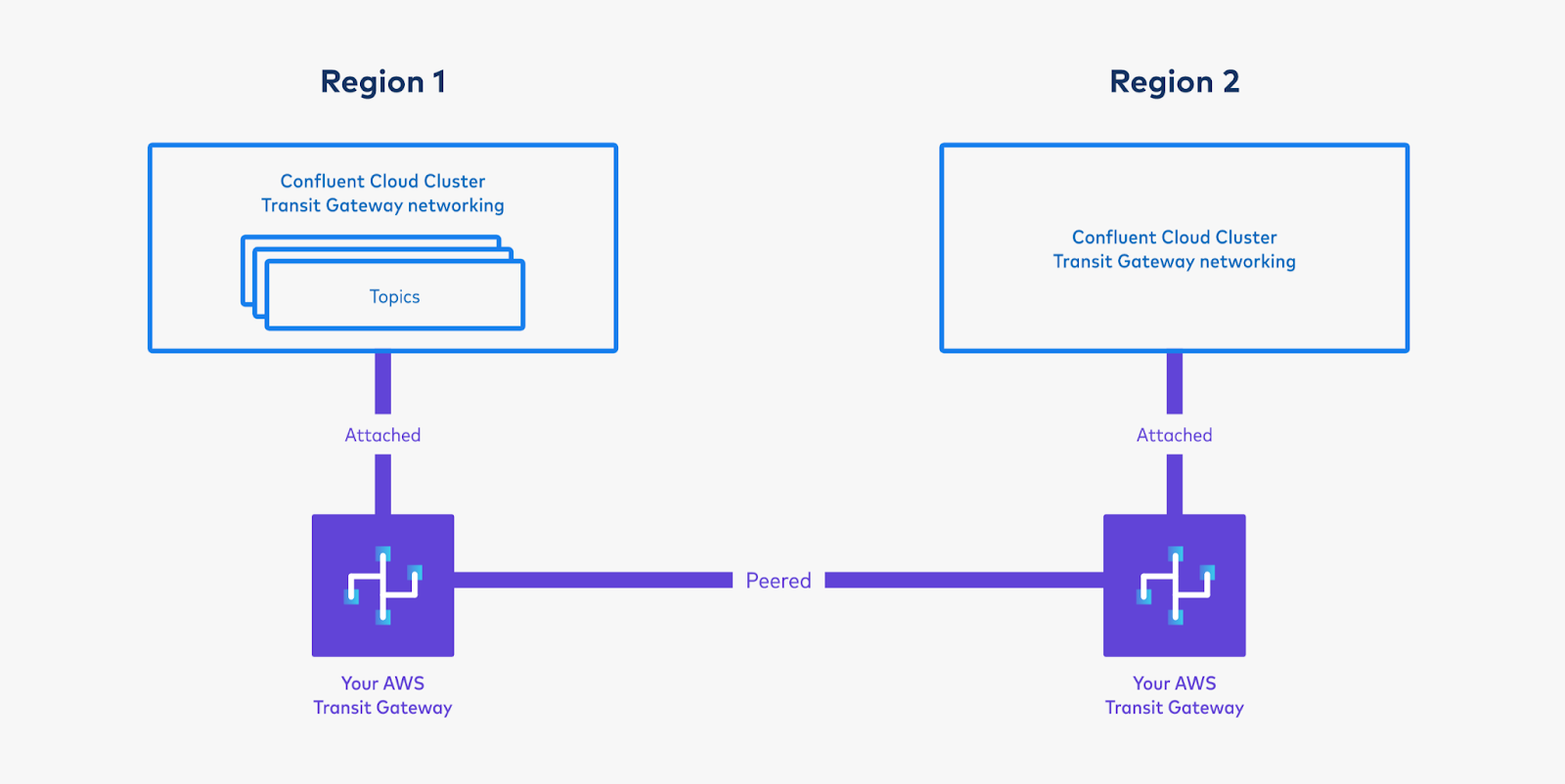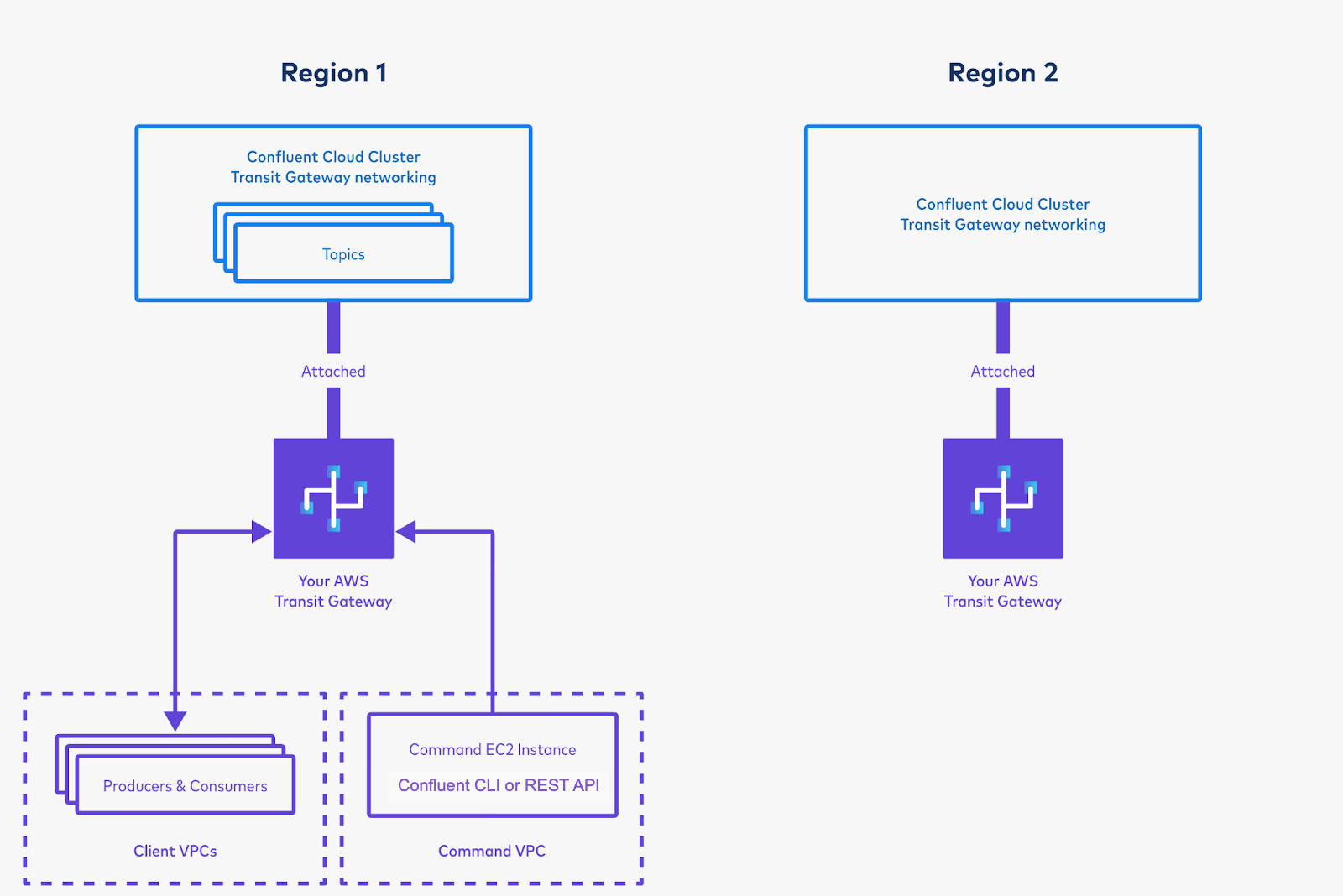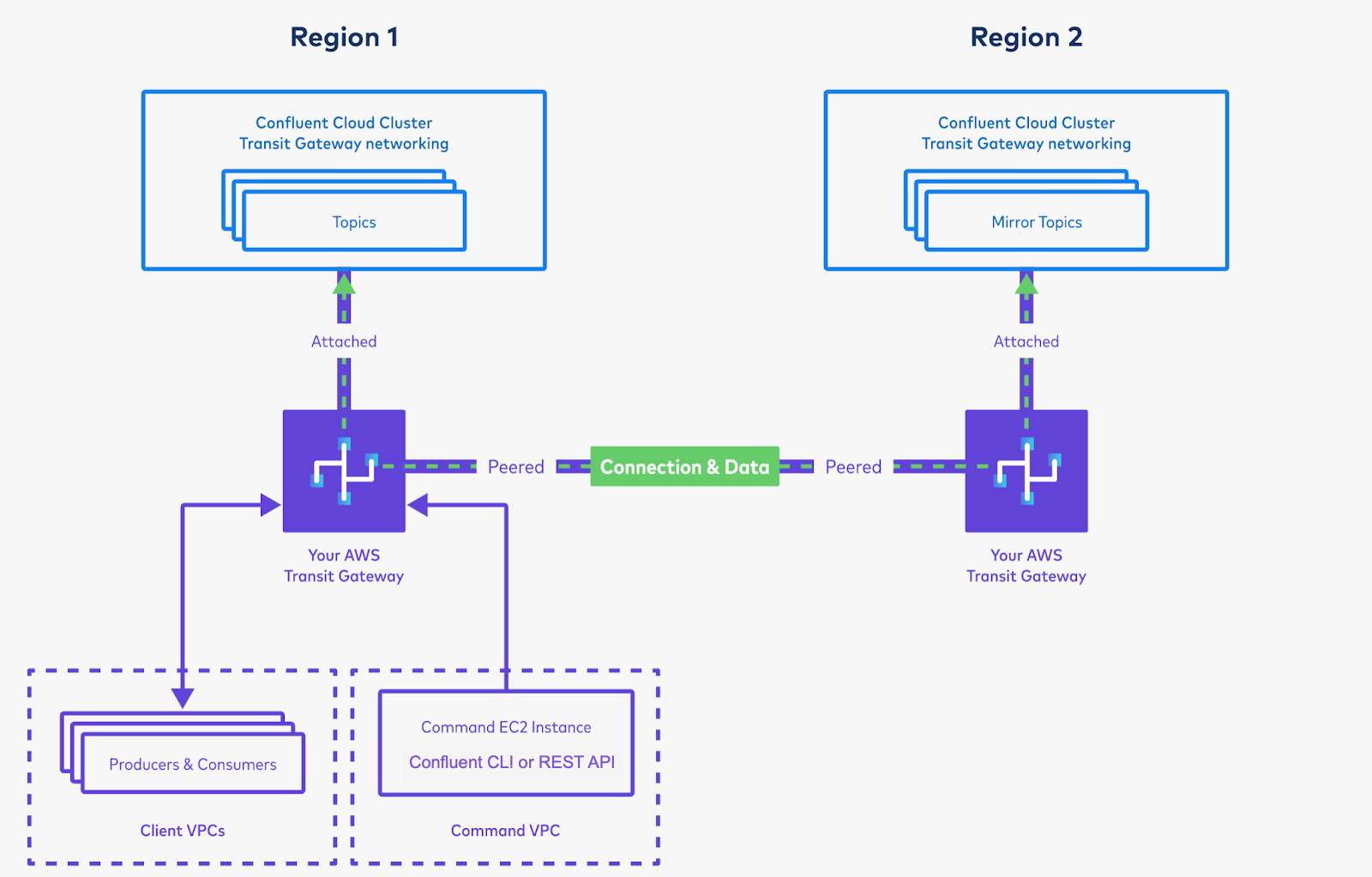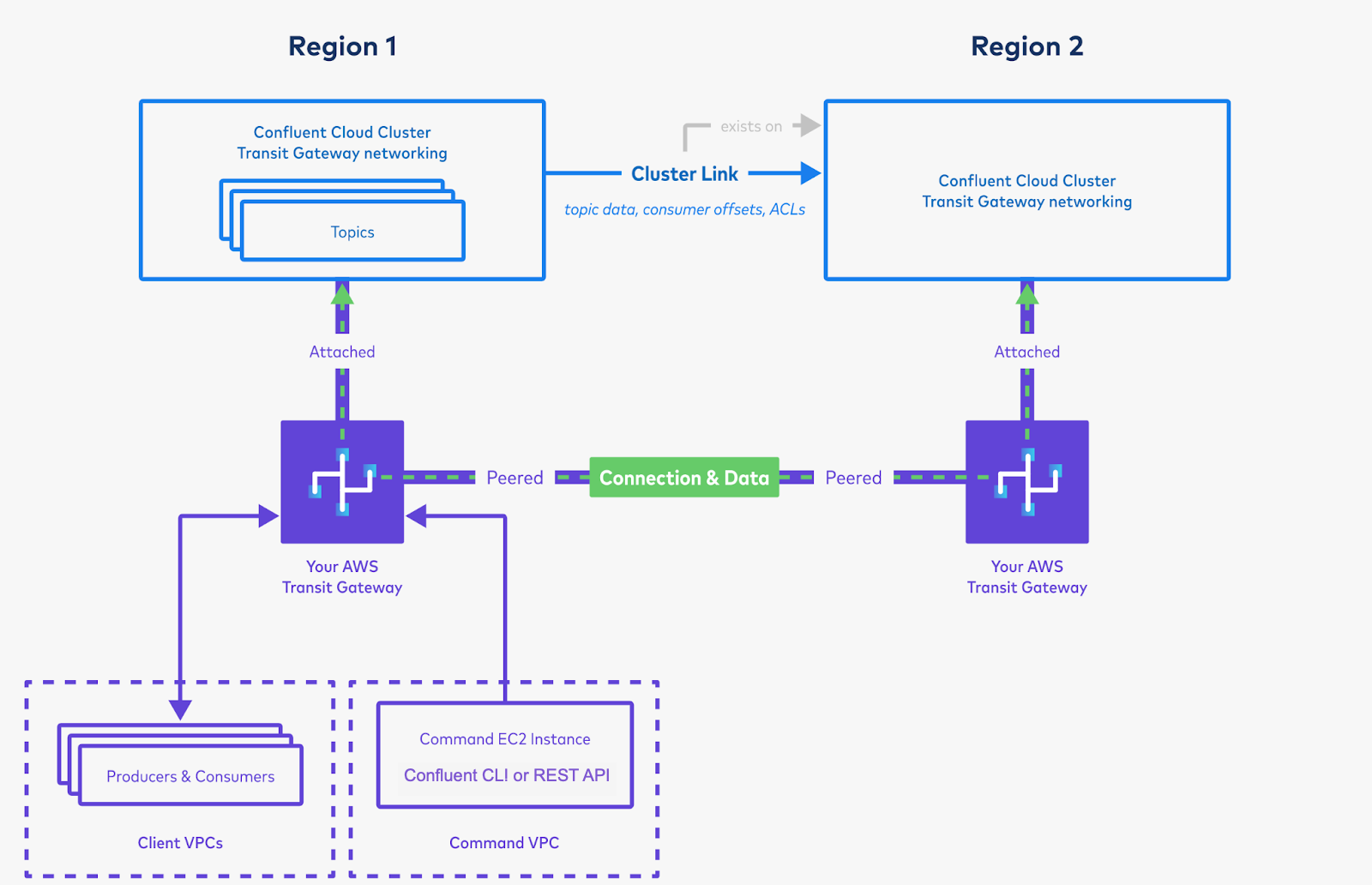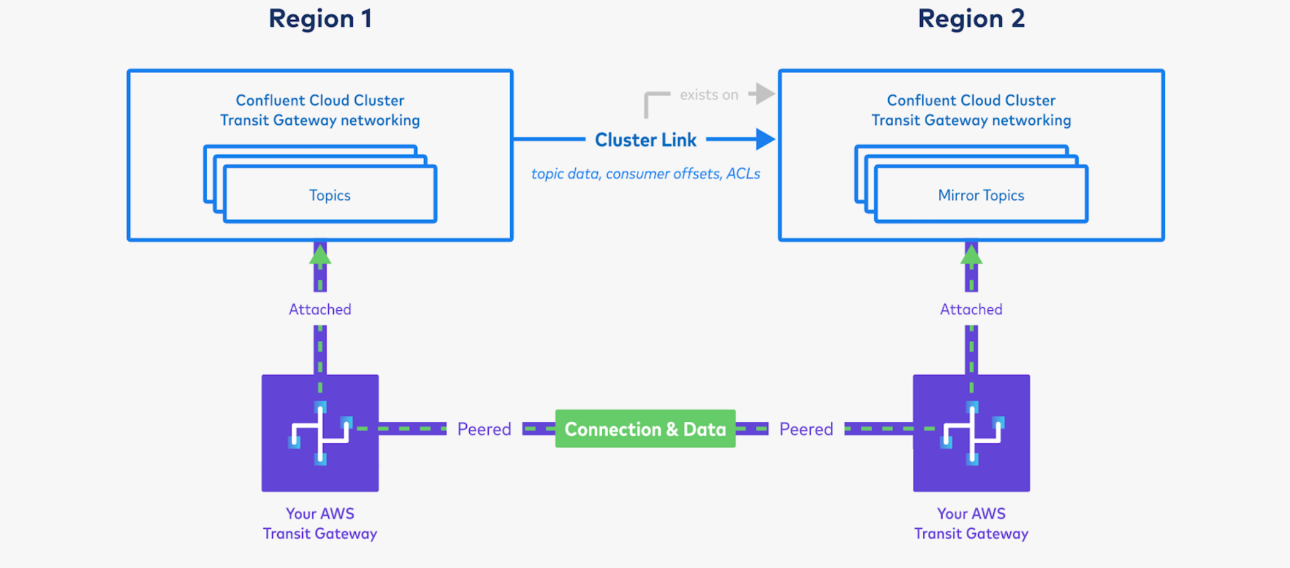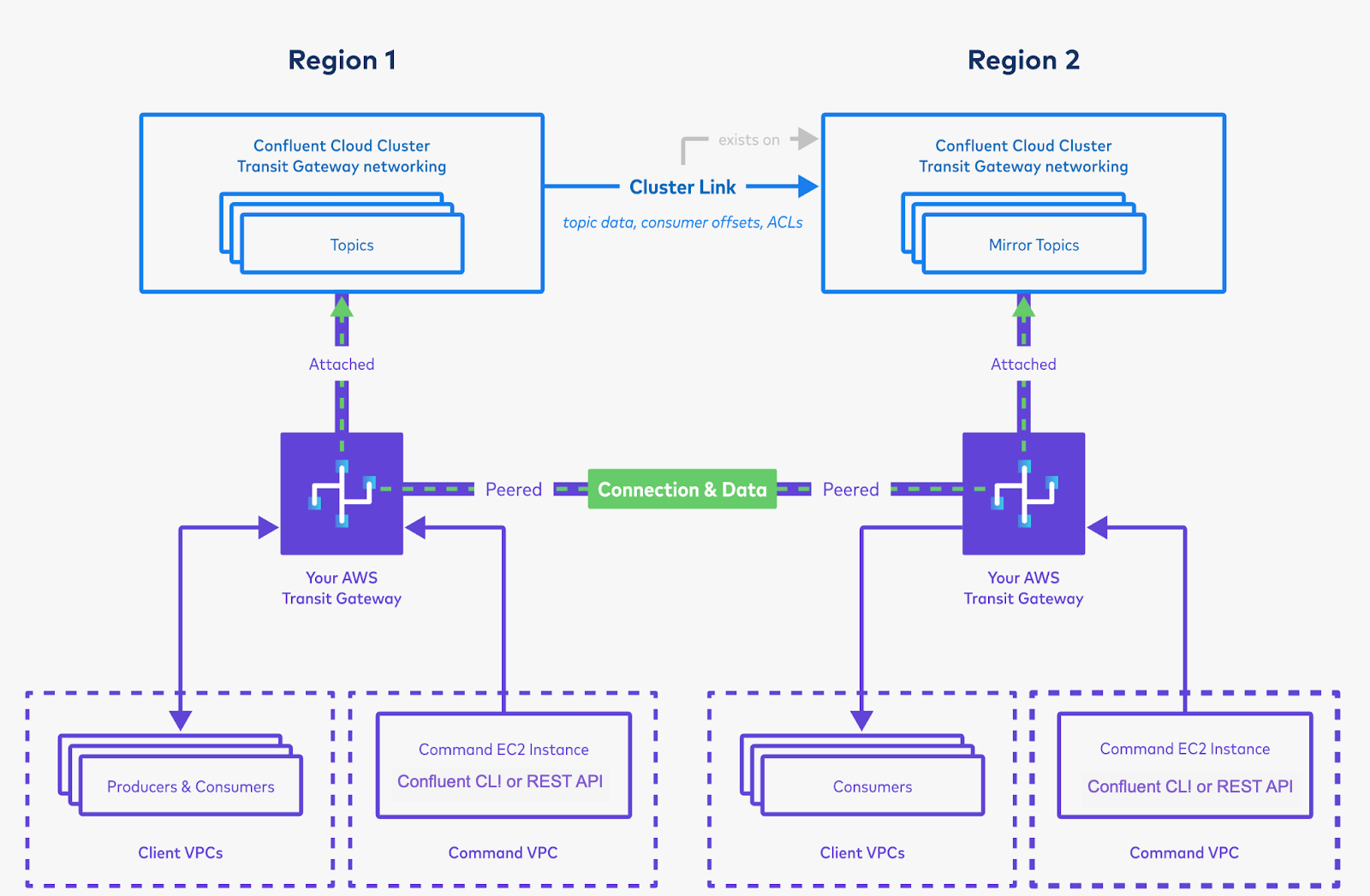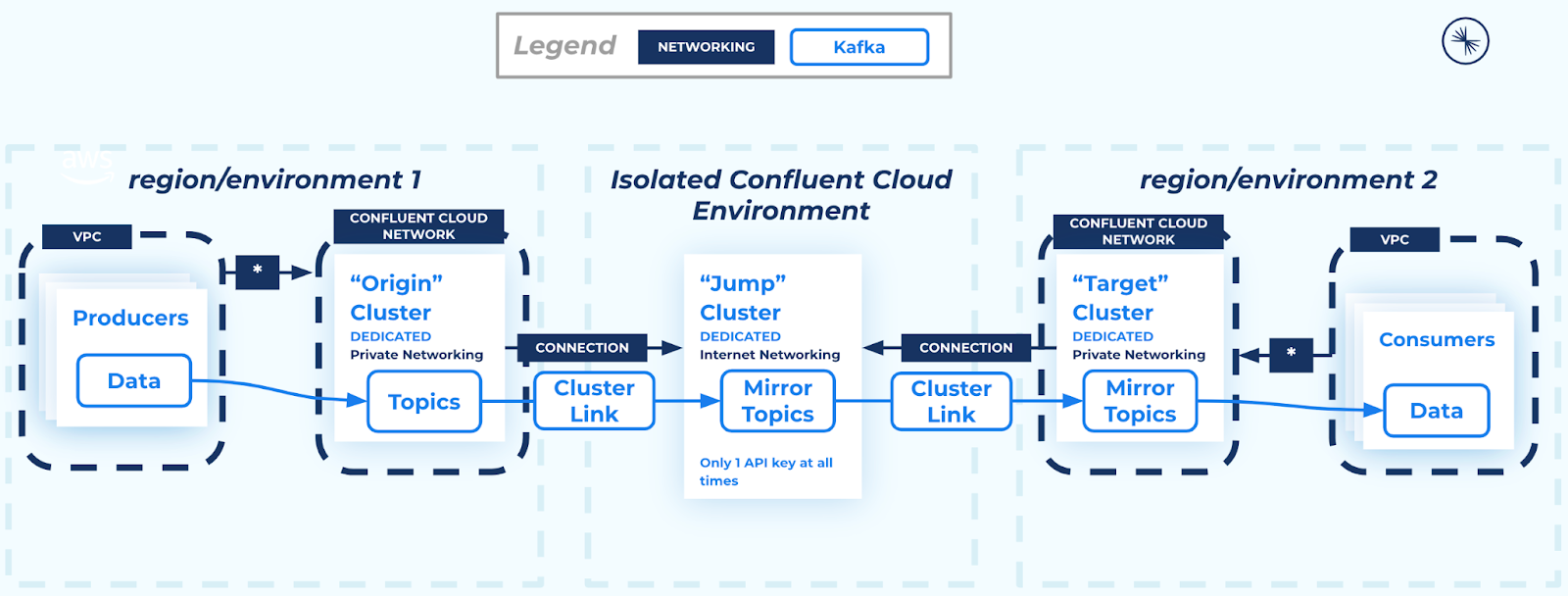Manage Private Networking for Cluster Linking on Confluent Cloud¶
The following sections describe supported cluster combinations, commands, configurations, use cases, and walkthroughs for private networking on Confluent Cloud.
Supported cluster combinations¶
Cluster Linking is fundamentally a networking feature: it copies data over the network. As such, Cluster Linking requires that at least one of the clusters involved has connectivity to the other cluster. Therefore, the networking situation of each cluster determines whether the two clusters can be linked, and whether the destination cluster or the source cluster must initiate the connection. By default, the destination cluster will initiate the connection. A special mode called “source-initiated links” allows the source cluster to initiate the connection of the cluster link.
The following tables show which networking combinations are possible, and whether a source-initiated link is required.
Tip
When using the Confluent Cloud Console to create cluster links, only linkable clusters are shown in the drop-down options. Clusters that cannot be linked are filtered out.
Confluent Cloud source and destination clusters¶
| Source cluster | Destination cluster | Possible? | Notes |
|---|---|---|---|
| Confluent Cloud - Basic or Standard cluster, or a Dedicated [1] cluster with secure public endpoints | Confluent Cloud - Any Dedicated cluster | Yes | |
| Confluent Cloud - Dedicated Cluster with AWS PrivateLink | Confluent Cloud - Dedicated cluster with AWS PrivateLink | Yes |
|
| Confluent Cloud - Cluster with private networking | Confluent Cloud - Dedicated cluster in the same Confluent Cloud network | Yes | |
| Confluent Cloud - Dedicated cluster with Transit Gateway networking | Confluent Cloud - Dedicated cluster with Transit Gateway networking | Yes |
|
| Confluent Cloud - Cluster with private networking | Confluent Cloud - Cluster with private networking | Only the cases noted above |
|
| Confluent Cloud - Cluster with private networking | Confluent Cloud - Dedicated cluster with public networking | Yes |
|
| [1] | Basic, Standard, and Dedicated cluster types are described in Supported cluster types. |
| [2] | Preview scenarios are for testing and evaluation purposes or to give feedback to Confluent. They are not suitable for production use cases and do not fall into any Confluent Support SLAs. |
| [3] | Classless Inter-Domain Routing (CIDR) is explained in the AWS documentation. |
Note
To learn more about all available Confluent Cloud cluster types, see Kafka Cluster Types in Confluent Cloud. The above table shows supported cluster types for this particular Cluster Linking scenario (private networking). For a more general overview of supported cluster types for Cluster Linking, see Supported cluster types.
Confluent Platform and Confluent Cloud¶
| Source cluster | Destination cluster | Possible? | Notes |
|---|---|---|---|
| Confluent Platform 7.1.0 or later | Confluent Cloud - Any Dedicated cluster | Yes |
|
| Confluent Platform 5.4+ with public endpoints on all brokers | Confluent Cloud - Any Dedicated cluster | Yes |
|
| Confluent Platform 5.4+ without public endpoints | Confluent Cloud - A Dedicated cluster with VPC Peering, VNet Peering, or Transit Gateway | Yes |
|
| Confluent Cloud - A Basic or Standard cluster, or a Dedicated cluster with secure public endpoints | Confluent Platform 7.0.0 or later | Yes | |
| Confluent Cloud - A cluster with private networking | Confluent Platform 7.0.0 or later | Yes |
|
Confluent Cloud and Apache Kafka®¶
| Source cluster | Destination cluster | Possible? | Notes |
|---|---|---|---|
| Kafka 2.4 or later with public endpoints on all brokers | Confluent Cloud - Any Dedicated cluster | Yes |
|
| Kafka 2.4 or later without public endpoints | Confluent Cloud - A Dedicated cluster with VPC Peering, VNet Peering, or Transit Gateway | Yes |
|
Diagrams of Supported Combinations for Private Networking¶
Confluent Cloud to Confluent Cloud¶
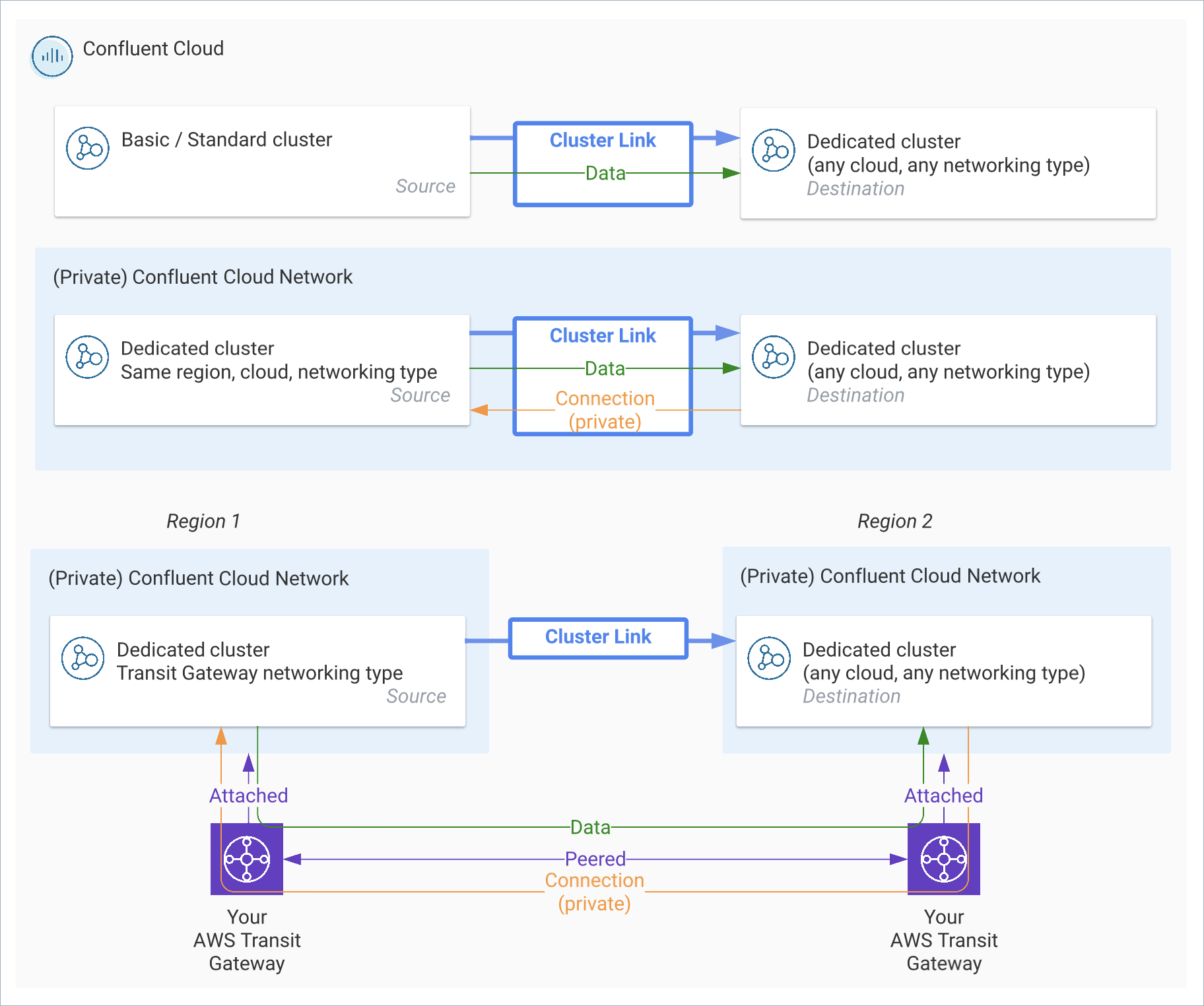
Confluent Cloud to Confluent Platform/Apache Kafka®¶
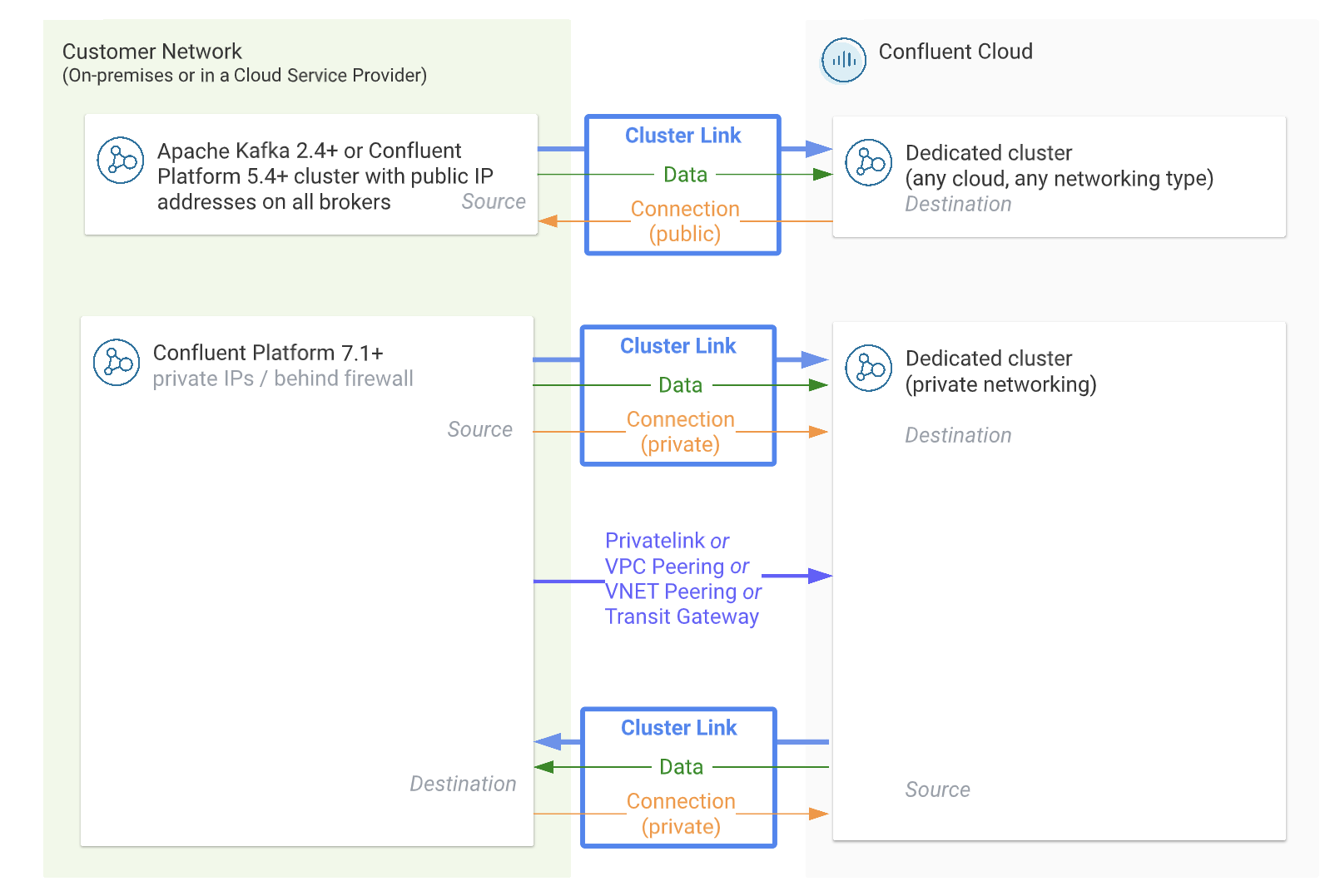
How to use cluster links with private networking¶
Using the Confluent Cloud Console for Cluster Linking with private networking¶
To view, create, and modify cluster links and mirror topics in the Confluent Cloud Console, the cluster link’s destination cluster must be accessible from your browser. If your destination cluster is a Confluent Cloud cluster with private networking, you must have completed the setup described in Use Confluent Cloud with Private Networking.
If your browser cannot access the destination cluster, you will not see any cluster links on that cluster, nor an indication of which topics are mirror topics. You will not be able to create a cluster link with that cluster as its destination cluster.
If your source cluster is also a Confluent Cloud cluster with private networking, then some features of the Confluent Cloud Console require your browser to be able to reach your source cluster, also:
- Creating a “Confluent Cloud to Confluent Cloud” cluster link as an OrganizationAdmin, which creates ACLs and an API key on the source cluster.
- Viewing the source cluster topics’ throughput metric on a cluster link
- Using the drop-down menu of source cluster topic names to create a mirror topic. Topic names must be entered manually.
When creating a cluster link in the Confluent Cloud Console, rest assured that the drop-down menus automatically filter for source clusters and destination clusters that can be linked. If you see a drop-down option for the cluster, then a cluster link is possible and generally available. Preview cases are excluded from the drop-downs, and require using the Confluent CLI or the Confluent Cloud REST API to create a cluster link.
Running Cluster Linking API and CLI commands with private networking¶
Cluster Linking commands require that the location where you are running them has access to the destination cluster of the cluster link:
- Creating, updating, listing, describing, and deleting cluster links
- Creating, listing, and describing mirror topics
For example, when running the Confluent CLI command, the shell must have access to the destination cluster. If your destination cluster has private networking, one way to achieve this is to SSH into a virtual machine that has network connectivity (by means of PrivateLink, Transit Gateway, or Peering) to the destination cluster.
Managing cluster links with private networking¶
Aside from the above mentioned requirements, the user experience when using a cluster link with private networking is the same as when using a cluster link with public networking. The same commands work in the same ways. That means you can follow the same Cluster Linking tutorials using the same steps, regardless of whether your clusters use public or private networking.
Exception: When Cluster Linking from a cluster with private networking to a cluster with public networking, a source-initiated link is required. This introduces different configurations and an extra step.
Cluster Linking between AWS PrivateLink Confluent Cloud clusters¶
You can use Cluster Linking on Confluent Cloud to create a cluster link that perpetually mirrors data between two Confluent Cloud clusters in different AWS regions, each with the “AWS PrivateLink” networking type. Both clusters must be in the same Confluent Cloud organization.
Requirements¶
To implement AWS PrivateLink on Confluent Cloud, you must have an active Confluent Cloud organization containing:
- One or more users with these RBAC roles:
- OrganizationAdmin, or
- EnvironmentAdmin, or
- Both NetworkAdmin and CloudClusterAdmin (roles can be on different user accounts)
- Two Dedicated Confluent Cloud clusters with AWS PrivateLink (any regions)
- Ability to send REST API calls over the Internet to Confluent Cloud
- Connectivity to your AWS PrivateLink clusters via Confluent Cloud Console, REST API, the Confluent CLI, and/or Terraform
Limitations¶
- An Organization supports a maximum of 20 Network Link Endpoints
- A Confluent Cloud network supports a maximum of 5 Network Link Endpoints
- Usage of the advanced “source-initiated link” feature is not allowed.
- Cluster links must be between clusters in the same Confluent Cloud Organization. Cross-organization cluster linking between AWS PrivateLink clusters is not supported.
Mental Model¶
When AWS PrivateLink is used to connect to a Confluent Cloud cluster, the cluster is isolated in its own Confluent Cloud network for network-level security. This prevents external resources, including Cluster Linking, from connecting to the Kafka cluster. Thus, in order to use Cluster Linking between two Confluent Cloud clusters in different Confluent Cloud networks, a secure networking path is required between the two Confluent Cloud networks. You can create this secure network path using resources called a Network Link Service and a Network Link Endpoint, as described in the networking document Cluster Linking using AWS PrivateLink.
- Network Link Services allow secure inbound connectivity from specific networks that you specify.
- Network Link Endpoints allow secure outbound connectivity to specific networks that you specify.
- To use Cluster Linking between two AWS PrivateLink clusters in different Confluent Cloud Organizations,
you first must establish secure connectivity between the clusters as follows:
- Create a Network Link Service in the source cluster Confluent Cloud network to allow incoming connectivity from the destination cluster Confluent Cloud network.
- Then, create a Network Link Endpoint in the destination cluster Confluent Cloud network. This allows secure outbound connectivity to the source cluster.
- The Network Link Service and Network Link endpoint must be in the same Confluent Cloud Organization. Cross-organization cluster linking between AWS PrivateLink clusters is not supported.
REST API for Network Resources¶
The REST API for Network Link Endpoints and Services are shown in the Confluent Cloud APIs reference under Network Link Services (networking/v1) and are used in the tutorial that follows.
Terraform for Networking Resources¶
The Terraform documentation for Network Link Endpoints and Services is here:
An end-to-end example is shown in this public GitHub repo here: confluentinc/terraform-provider-confluent
Tutorial: Create a Network Link and Cluster Link¶
This tutorial uses the REST API, as described in REST API for Network Resources. To learn more about network links, see also Cluster Linking using AWS PrivateLink.
Decide on the source cluster and destination cluster for the cluster link. You will need the following information about these clusters:
- Environment ID and Network ID containing the source cluster
- Environment ID and Network ID containing the destination cluster
- Cloud API key(s) for user(s) with RBAC role authorization over the source cluster, either:
- OrganizationAdmin, or
- EnvironmentAdmin, or
- Both NetworkAdmin and CloudClusterAdmin (roles can be on separate user accounts, if needed)
- Cloud API key(s) for user(s) with RBAC role authorization over the destination cluster, either:
- OrganizationAdmin, or
- EnvironmentAdmin, or
- Both NetworkAdmin and CloudClusterAdmin (roles can be on separate user accounts, if needed)
Tip
The same Cloud API key may be used as for the source cluster if the user has authorization over both clusters. This tutorial uses one API key referenced with these bash environment variables:
CLOUD_API_KEY=<your-cloud-api-key>CLOUD_API_SECRET=<your-cloud-api-secret>
Step 1: Create Network Link Service¶
Create the Network Link Service by sending a POST REST API request as a properly authenticated user who has OrganizationAdmin, EnvironmentAdmin, or NetworkAdmin over the source cluster:
curl --location 'https://api.confluent.cloud/networking/v1/network-link-services' \
--header 'Content-Type: application/json' \
--header "Authorization: Basic $(echo -n "$CLOUD_API_KEY:$CLOUD_API_SECRET" | base64)" \
--data '{
"spec": {
"display_name": "<a-name-of-your-choosing>",
"description": "<an-optional-description>",
"environment": {
"id": "<source-cluster-environment-id>"
},
"network": {
"id": "<source-cluster-network-id>"
},
"accept": {
"networks": [ "<destination-cluster-network-id>" ]
}
}
}'
Take note of the ID of the network_link_service in the REST API response. If lost, this ID can be retrieved with a
GET REST API call:
curl --location 'https://api.confluent.cloud/networking/v1/network-link-services?environment=<source-cluster-environment-id>' \
--header "Authorization: Basic $(echo -n "$CLOUD_API_KEY:$CLOUD_API_SECRET" | base64)"
Note
For advanced setups:
- Multiple network IDs can be listed at once
- As an alternative to a network, to allow secure inbound connectivity from an entire Confluent Cloud Environment, pass an environment with the destination cluster environment ID(s) instead
Step 2: Create Network Link Endpoint¶
Create the Network Link Endpoint by sending the POST REST API request as a properly authenticated with a user who has OrganizationAdmin, EnvironmentAdmin, or NetworkAdmin over the destination cluster:
curl --location 'https://api.confluent.cloud/networking/v1/network-link-endpoints' \
--header 'Content-Type: application/json' \
--header "Authorization: Basic $(echo -n "$CLOUD_API_KEY:$CLOUD_API_SECRET" | base64)" \
--data '{
"spec": {
"display_name": "<another-name-of-your-choosing>",
"description": "<an-optional-description>",
"environment": {
"id": "<destination-cluster-environment-id>"
},
"network": {
"id": "<destination-cluster-network-id>"
},
"network_link_service": {
"id": "<ID-of-network-link-service>"
}
}
}'
Step 3: Wait until the Network Link Endpoint is READY¶
It takes several minutes to establish secure connectivity. When ready to be used by Cluster Linking, the network link endpoint’s status will change from PROVISIONING to READY, which you can check with a GET REST API call:
curl --location 'https://api.confluent.cloud/networking/v1/network-link-endpoints?environment=<destination-cluster-environment-id>' \
--header "Authorization: Basic $(echo -n "$CLOUD_API_KEY:$CLOUD_API_SECRET" | base64)"
To learn more about this step, see Check Network Link Endpoint status in the network link documentation.
Step 4: Create the Cluster Link¶
After the Network Link Endpoint is in READY status, create a cluster link using your preferred method. The Confluent Cloud Console, the Confluent CLI, REST API, or Terraform are all valid methods to create a cluster link. Here is an example of how to create one using the Confluent CLI:
Create or retrieve an API key for the source cluster. The API key should correspond to a Service Account that has appropriate read permissions on the source cluster. Copy-paste command examples are available in the Cluster Linking security tutorial.
From a network that has network access to the Destination cluster (such as, an EC2 instance in a VPC with the PrivateLink endpoint), issue the command to create a cluster link:
confluent kafka link create <name-of-your-choosing> \ --source-cluster <source-cluster-id> \ --source-bootstrap-server <source-cluster-bootstrap> \ --source-api-key <api-key-for-source-cluster> \ --source-api-secret <api-secret-for-source-cluster>
To learn more, browse these resources which walk through how to create a cluster link step-by-step for various use cases:
- Cluster Linking Quick Start is a fast-paced tutorial
- The Cluster Linking Data Sharing tutorial is an in-depth tutorial
- The Disaster Recovery Whitepaper covers how to architect an active-passive DR setup in Confluent Cloud
- The Cluster Linking Disaster Recovery page gives a basic overview of Cluster Linking for Disaster Recovery
Congratulations, you have successfully geo-replicated data between two AWS PrivateLink Confluent Cloud clusters!
To learn more about what you can accomplish with Confluent Cloud and mirror topics, see the Cluster Linking docs and examples.
Deleting the cluster links and networking resources¶
If you want to remove cluster links and stop accruing charges, you can delete them in any order with the following command:
confluent kafka link delete <link-name> --cluster <cluster-id>
Or on the Confluent Cloud Console, the REST API, or Terraform.
If all cluster links are deleted and you no longer need the network links, use the DELETE REST API to delete the Network Link Endpoint(s) first, and then delete the Network Link Service.
Stopping the data flow¶
Deleting any one resource–cluster link, network link service, or network link endpoint will stop data from being mirrored from source to destination cluster.
Removing the destination cluster network or environment ID from the allowed list of IDs in the Network Link Service will also stop the data flow.
Cluster Linking between AWS Transit Gateway attached Confluent Cloud clusters¶
Confluent provides Cluster Linking between AWS Transit Gateway Confluent Cloud clusters as a fully-managed solution for geo-replication, multi-region, high availability and disaster recovery, data sharing, or aggregation.
This section describes how to use Cluster Linking to sync data between two private Confluent Cloud clusters in different AWS regions that are each attached to an AWS Transit Gateway. You can provision new Confluent Cloud clusters or use existing AWS Transit Gateway attached or AWS virtual private cloud (VPC) Peered Confluent Cloud clusters.
Limitations¶
This is limited to Confluent Cloud clusters that use AWS Transit Gateway as their networking type.
Tip
AWS VPC Peered clusters can be seamlessly converted to AWS Transit Gateway clusters with a Confluent support ticket. The Confluent Cloud clusters can be in the same or in different Confluent Cloud Environments or Organizations. The Transit Gateways can be in the same or different AWS Accounts. Connecting clusters from different organizations is useful for data sharing between organizations.
The clusters must be provisioned with different CIDRs. The address ranges cannot overlap.
The CIDRs for both clusters must be within RFC 1918:
- 10.0.0.0/8
- 100.64.0.0/10
- 172.16.0.0/12
- 192.168.0.0/16
The CIDRs for either cluster cannot be 198.18.0.0/15, even though it is a valid Confluent Cloud CIDR.
This configuration does not support combinations with other networking types, such as PrivateLink, or with other cloud providers, such as Google Cloud or Microsoft Azure.
Setup¶
Step 1: Create the networks and clusters¶
Determine:
- the two regions to use
- the two non-overlapping /16 CIDRs for the two Confluent Cloud clusters to use
- the AWS account(s) to use
This decision will depend on your architecture and business requirements.
Note that:
- You can use only one region, but most use cases will involve two (or more) different regions.
- It is possible for the Cluster Linking to be between different AWS accounts or Confluent Cloud accounts, but most use cases will involve one AWS account and one Confluent Cloud account.
Provision two AWS Transit Gateways, one in each region, and create two resource shares; one for each Transit Gateway, as described in Use AWS Transit Gateway with Confluent Cloud under Networking.
Open two support tickets to Confluent, each requesting Confluent to provision a new Transit Gateway enabled Confluent Cloud network, as described in Use AWS Transit Gateway with Confluent Cloud.
You will need to specify the network ID and the ARN of the resource share containing that region’s Transit Gateway. It is possible to seamlessly convert an existing AWS VPC Peered Confluent Cloud cluster in that region to a Transit Gateway attached cluster. If you choose that option, let Confluent know the name and cluster ID of the existing cluster in the support ticket. Turn around time is generally three to five business days.
Connect a “Command VPC” from which to issue commands, and create topics on the Confluent Cloud cluster in “Region 1”.
Create a new VPC in Region 1, from which to run commands against your Confluent Cloud cluster. For purposes of this example, call this the “Command VPC”.
Attach the Command VPC to your Transit Gateway. (Make sure you have a route in the Transit Gateway’s route table that points to the Command VPC for the Command VPC’s CIDR range.)
In the Command VPC’s route table, create the following routes if they do not already exist:
Component Route to: Command VPC CIDR range localConfluent Cloud CIDR range in this region Transit Gateway in this region Confluent Cloud CIDR range in the other region Transit Gateway in this region $0.0.0.0/0An Internet Gateway (create one if needed) [4] [4] $0.0.0.0/0enables this VPC to reach out to the internet to install the Confluent CLI.
Create and launch an EC2 instance in that VPC.
SSH into the EC2 instance. (If needed for this step, create an Elastic IP and assign it to this EC2 instance.)
Log on to the Confluent CLI with confluent login.
Select your Confluent environment with confluent environment use <environment-ID>. (You can list your environments with confluent environment list <environment-ID>.)
Select your Confluent cluster in this region with confluent kafka cluster use <cluster-id>. (You can list your clusters with confluent kafka cluster list.)
List the topics in your Confluent Cloud cluster with confluent kafka topic list. If this command fails, your Command EC2 instance may not be able to reach your Confluent Cloud cluster. Your networking may not be correctly set up. Make sure you followed the steps above. See the Troubleshoot section if needed.
Create a new topic with confluent kafka topic create my-topic –partitions 1. If you have more Apache Kafka® clients, you can spin them up in VPCs attached to the Transit Gateway, and produce to and consume from the cluster.
Step 2: Create a cluster link¶
After you have two Transit Gateway-attached Confluent Cloud clusters, you can set up Cluster Linking between the two clusters to copy data and metadata from one to the other.
Peer the Transit Gateways. This will create connectivity between the two. This can be done cross-account, if needed.
Set up routes and propagation so that the two clusters have connectivity to each other.
In each Transit Gateway’s Route Table, these routes are required:
Component Route to: To the local Confluent Cloud cluster - CIDR: This region’s Confluent Cloud cluster CID
- Type: Propagated
- Destination: a Confluent VPC [5]
To the other region’s Confluent Cloud cluster - CIDR: The other region’s Confluent Cloud cluster CID
- Type: Static
- Destination: Peering — the other region’s Transit Gateway, that was peered
To the other command VPC in this region [6] - CIDR: CIDR range of your Command VPC
- Type: Propagated
- Destination: Command VPC
To the other command VPC in the other regions (if applicable) - CIDR: CIDR range of your Command VPC
- Type: Propagated
- Destination: Command VPC
[5] You can find the VPC ID in the Confluent Cloud Console under this cluster’s Network).
[6] Region 1 needs a Command VPC for now, but in a DR scenario, you would need to be able to access your Confluent Cloud clusters from any region.
Check that the Command VPC from Region 1 can access the Confluent Cloud cluster in Region 2. This ensures that your networking is set up properly.
- List the cluster’s topics with
confluent kafka topic list --cluster <region-2-cluster-id>. - If this command succeeds, then you’ve verified that Confluent Cloud has inter-region connectivity!
- List the cluster’s topics with
Set up privileges on the cluster in Region 1 for the cluster link, and create a cluster link on Region 2’s cluster.
You will use the bootstrap server of the cluster in Region 1. Because you have peered the Transit Gateways and set up routing between the two clusters, the cluster in Region 2 will be able to resolve the private CIDR of the cluster in Region 1.
As long as your Command VPC can reach the Destination Cluster (Region 2 in this picture), it does not matter which region the Command VPC is in. (It is okay to run the command from Region 1.)
Create mirror topics using the cluster link, and produce and consume the data. This will bring data from Region 1 to Region 2.
- Follow the Quick Start instructions or the more in-depth Data sharing tutorial instructions.
- It is okay to run these commands from Region 1, even if they are against Region 2’s cluster, as long as your Command VPC has connectivity to Region 2’s cluster. Successfully consuming messages from Region 2 proves the inter-region replication is working, no matter where your Command VPC itself lives.
Now, you can spin up more Kafka producers and consumers in Region 1, and Kafka consumers in Region 2. You can also create a Command VPC in Region 2, so that you can issue
confluentcommands should Region 1 experience an outage.You can also set up a cluster link in the opposite direction, too. You only need to repeat steps 4 through 6 above. You do not need to set up additional networking to create additional cluster links. You only need to set up the networking once.
Cluster Linking between two Confluent Cloud clusters in the same region¶
If you want to create a cluster link between two AWS Transit Gateway Confluent Cloud clusters in the same AWS region, this is a special case in which the requirements may be different, depending on the networking setup: Here are some scenarios and factors to consider:
- If both Confluent Cloud clusters are in the same Confluent Cloud network, the additional configuration described in previous sections is not necessary, Only one Transit Gateway is required; without any Transit Gateway peering or changes to its route table.
- If the Confluent Cloud clusters are in different Confluent Cloud networks, but both are attached to the same Transit Gateway, then the only requirement is that they use the same Transit Gateway Route Table. The routes from each CIDR to each Confluent VPC must be in the same route table. No Transit Gateway Peering is required.
- If the Confluent Cloud clusters are attached to different Transit Gateways, then the above configuration is required. The steps are no different for two Transit Gateways in the same region from two Transit Gateways in different regions.
Management responsibilities¶
Every cluster link runs as a continuous service managed by Confluent Cloud. Keeping a cluster link running is a shared responsibility between Confluent and its customers:
- Confluent is responsible for the Cluster Linking service.
- The customer is responsible for the network that facilitates the connection between the two clusters.
To operate a cluster link between two AWS Transit Gateway Confluent Cloud clusters, Confluent requires that the AWS networking be configured as laid out in the sections on this page.
Troubleshoot Transit Gateway Cluster Linking¶
This section covers these issues:
For more troubleshooting help, see Troubleshoot Cluster Linking on Confluent Cloud.
My CLI commands / API calls are failing¶
Often, CLI commands may fail if you are not running them from a place that has connectivity to your Confluent Cloud cluster. Verify that your CLI (for example, which may be running in a Command EC2 instance) has connectivity to the Confluent Cloud cluster.
You can test connectivity to the cluster with:
confluent kafka cluster describe <destination-cluster-id>
Get the URL out of REST Endpoint.
telnet <url> 443
Tip
Note the space in front of
443instead of a colon (:).Example success showing connectivity:
telnet pkc-z3000.us-west-2.aws.confluent.cloud 443 Trying 10.18.72.172… Connected to pkc-z3000.us-west-2.aws.confluent.cloud. Escape character is '^]'
Example failure (the command will hang indefinitely):
telnet pkc-z3000.us-west-2.aws.confluent.cloud 443 ...
If this process ends in failure, you are not running the CLI commands from a location that has connectivity to your Confluent Cloud cluster. Work with your networking team to ensure your instance is attached and routed to your Transit Gateway to the Confluent Cloud cluster.
Troubleshoot Transit Gateway connectivity¶
Ensure the Transit Gateways, Peering, and Route Tables are properly configured.
Assuming a transit gateway in Region A and one in Region B, with CIDRs CIDR-A and CIDR-B :
Transit Gateway Region A route table
| Component | Route to: |
|---|---|
| CIDR-A | Confluent VPC A (Confluent is responsible for setting this) |
| CIDR-B | Transit Gateway B via Peering connection |
Transit Gateway Region B route table
| Component | Route to: |
|---|---|
| CIDR-A | Transit Gateway B via Peering connection |
| CIDR-B | Confluent VPC B (Confluent is responsible for setting this) |
Note that each transit gateway has routes set for both CIDRs. This may be the issue. If the
transit gateways are not both set up with both CIDRs, then the clusters will not
have connectivity to each other. The route between the two Confluent Cloud clusters and
transit gateways must allow traffic over port 9092.
You can test if the cross-region connectivity works like this:
Attach a Test VPC in Region A to A’s transit gateway.
Launch an EC2 instance in the Test VPC (or you can use the “Command VPC” if you set one up per the previous steps).
Route the EC2 instance into transit gateway in Region A:
Test VPC Route Table:
Component Route to: CIDR-Test-VPC: local CIDR-A Transit gateway A CIDR-B Transit gateway A (also) Transit gateway Region A Route Table: Add
CIDR-Test-VPC: Test VPC AttachmentTransit gateway Region B Route Table: Add
CIDR-Test-VPC: TGW A via Peering connection(needed for bidirectional connectivity)
SSH into the EC2 instance. For example, put an elastic IP on the EC2 instance.
Check connectivity to Cluster A:
telnet CIDR-A 9092
If successful, you should see similar output:
Trying 10.18.72.172... Connected to pkc-z3000.us-west-2.aws.confluent.cloud. Escape character is '^]'.
Check connectivity across the peering connection to Cluster B:
telnet CIDR-A 9092
If successful, you should see similar output:
Trying 10.18.72.172... Connected to pkc-z3000.us-west-2.aws.confluent.cloud. Escape character is '^]'.
Private to public Cluster Linking¶
Private to public Cluster Linking has some specific requirements and configurations. These are described below, followed by a walkthrough.
Requirements¶
These instructions apply to cluster links which fall under this category:
| Source Cluster | Dedicated Confluent Cloud cluster with private networking. Any cloud provider, region, and networking type (for example, PrivateLink, VPC Peering, Transit Gateway, and Private Service* Connect) |
| Destination Cluster | Dedicated Confluent Cloud cluster with secure public endpoints. |
The clusters can be in the same or different Confluent Cloud organizations.
Such a cluster link requires using a “source-initiated link”, which differs from other cluster links in these ways:
- A cluster link is created on the destination (as usual) but with certain configurations (described below).
- After the cluster link is created on the destination cluster, a cluster link object must be created on the source cluster, too. It must have certain configurations (described below).
- This type of cluster link cannot be created on the Confluent Cloud Console. It must be created using the cluster REST APIs, the Confluent CLI, Terraform, or Confluent for Kubernetes.
- Deleting either cluster link object –- source or destination –- will stop data from being replicated between the clusters.
- Both cluster link objects must be deleted in order to stop billing charges. If one is deleted but one remains, hourly billing charges may continue to accrue.
- The cluster link’s service account must have a CLUSTER:ALTER ACL on the destination cluster. Alternatively, the service account can have the CloudClusterAdmin RBAC role on the destination cluster.
Configurations¶
Destination cluster¶
The cluster link on the Destination cluster needs these configurations:
connection.mode=INBOUND- No bootstrap server, instead, the source cluster’s cluster link object will get this.
- No security configuration or authentication credentials; instead, the source cluster’s cluster link object will get these.
- Other optional configuration options for this cluster link, such as consumer offset sync, ACL sync, and prefix.
Source cluster¶
The cluster link on the Source cluster needs these configurations:
link.mode=SOURCEconnection.mode=OUTBOUND- Bootstrap server set to the Destination cluster’s bootstrap server
- Security credentials to authenticate into the Destination cluster. (These can be either API key or OAuth). The Service Account or user with these security credentials must have the CLUSTER:ALTER ACL on the destination (public) cluster, or alternatively the CloudClusterAdmin RBAC role.
- Security credentials to authenticate into the Source cluster. (These can be either API key or OAuth.)
- The service account or user associated with this API key needs the permissions described in Permissions for the cluster link to read from the source cluster.
- These configurations must all be prefixed with:
local. For example, the configurationsecurity.protocolshould be set aslocal.security.protocol.
Use the Confluent CLI to create a private to public link¶
The following steps walk through how to create a Private to Public cluster link using the Confluent CLI.
Private cluster¶
In this walkthrough, information about your private cluster is referred to as <private>.
You will need the following information about your private cluster:
- Cluster ID. This will have the format
lkc-XXXXX. You can get this using the command confluent kafka cluster list. This is referred to as<private-id>. - Cluster bootstrap servers. You can get this by describing the cluster with confluent kafka cluster describe;
confluent kafka cluster describe <private-id>. The bootstrap will be in the Endpoint row. This is referred to as<private-bootstrap>.
Public cluster¶
In this walkthrough, information about your private cluster is referred to as <public>.
You will need the following information about the public cluster:
- Cluster ID. This will have the format
lkc-XXXXX. You can get this using the command confluent kafka cluster list. This is referred to as<public-id>. - Cluster bootstrap server. You can get this by describing the cluster with confluent kafka cluster describe;
confluent kafka cluster describe <public-id>. The bootstrap will be in the Endpoint row. This is referred to as<public-bootstrap>.
Create the Public half of the link¶
Create a file called
public-destination-link.configwith these contents:link.mode=DESTINATION connection.mode=INBOUND
Tip
If you want to enable other features or configurations on this cluster link, like consumer offset sync, you can put those in the configuration file, too.
This configuration tells the cluster link to be the destination half of a “source initiated” cluster link.
Create the public half with this command:
confluent kafka link create private-to-public --cluster <public-id> \ --config public-destination-link.config \ --source-cluster <private-id>
Create the Private half of the link¶
Create security credentials for the private half of the link with two sets of API keys.
To create the Private half, you’ll need two sets of security credentials: one for each cluster. This is because the Private cluster must authenticate with the Public cluster to establish the cluster link, and then the cluster link must authenticate with the Private cluster to read data.
To get security credentials, you need API keys on both clusters. Choose one of the following methods; either for development and testing, or for production.
For development and testing, a quick way to do is with this commands:
confluent api-key create --resource <cluster-id>
This creates an API key with Admin privileges. This is not recommended for production or for clusters with sensitive data.
For production, create a Confluent Cloud service account for the cluster link and assign it ACLs on the source cluster (the private cluster), as described in Permissions for the cluster link to read from the source cluster.
Additionally, assign the service account the CLUSTER:ALTER ACL on the destination cluster (the public cluster):
confluent kafka acl create --allow --service-account <service-account-id> --operations alter --cluster-scope --cluster <destination-cluster-id>
If the clusters belong to two different owners or two different Confluent Cloud organizations, then two different service accounts will be needed: one for the source cluster and one for the destination cluster.
Using this service account or these service accounts, create two Kafka API keys, one on each Kafka cluster:
confluent api-key create --resource <cluster-id>
Create the Private link configuration file.
Create a file called
private-source-link.configthat contains all necessary link configurations with the following content:link.mode=SOURCE connection.mode=OUTBOUND security.protocol=SASL_SSL sasl.mechanism=PLAIN sasl.jaas.config=org.apache.kafka.common.security.plain.PlainLoginModule required username='<public-api-key>' password='<public-api-secret>'; local.security.protocol=SASL_SSL local.sasl.mechanism=PLAIN local.sasl.jaas.config=org.apache.kafka.common.security.plain.PlainLoginModule required username='<private-api-key>' password='<private-api-secret>';
This file creates a cluster link and specifies:
- this is the source half of a “source initiated” cluster link (top two lines).
- where to find the destination cluster and how to authenticate with it (the middle section).
- how to authenticate with the source cluster (the bottom section, prefixed with
local).
Run the command to create the private half of the link.
confluent kafka link create private-to-public \ --cluster <private-id> \ --destination-cluster-id <public-id> \ --destination-bootstrap-server <public-bootstrap-url> \ --config private-source-link.config
You should see a success message. If so, you now have a link between your clusters that you can use to create mirror topics.
If the command times out after 30 seconds, then the private cluster was unable to reach and authenticate into your source cluster using the provided information. Make sure you can consume from the source cluster using the
public-link.configfile.
Create a mirror topic and replicate data¶
Now that you’ve got a cluster link from your Private cluster to your Public one, you can use the cluster link to create mirror topics as described in Mirror a topic.
Use the REST API to create a private to public link¶
The API call to create a cluster is described in Create a cluster link in the Confluent Cloud API reference.
To use this call to create a private to public link with the REST API:
CloudClusterAdmin, EnvironmentAdmin, or OrganizationAdmin for the public cluster sends this request:
POST to {Public_Cluster_REST_API}/kafka/v3/clusters/{Public_Cluster_ID}/links?link_name={link_name}For example:
https://pkc-12345.us-west-2.aws.confluent.cloud:443/kafka/v3/clusters/lkc-12345/links?link_name=private-to-public{ "source_cluster_id": "<private-cluster-id>", "configs": [ { "name": "link.mode", "value": "DESTINATION" }, { "name": "connection.mode", "value": "INBOUND" } ] }
An OrganizationAdmin, EnvironmentAdmin, or CloudClusterAdmin for the private cluster sends this request to the private cluster:
POST to {Private_Cluster_REST_API}/kafka/v3/clusters/{Private_Cluster_ID}/links?link_name={link_name}For example:
https://lkc-67890-67890.us-west-2.aws.glb.confluent.cloud:443/kafka/v3/clusters/lkc-67890/links?link_name=private-to-public{ "destination_cluster_id": "<public-cluster-id>", "configs": [ { "name": "link.mode", "value": "SOURCE" }, { "name": "connection.mode", "value": "OUTBOUND" }, { "name": "bootstrap.servers", "value": "<public-bootstrap-server>" }, { "name": "security.protocol", "value": "SASL_SSL" }, { "name": "sasl.mechanism", "value": "PLAIN" }, { "name": "sasl.jaas.config", "value": "org.apache.kafka.common.security.plain.PlainLoginModule required username='<public-api-key>' password='<public-api-secret>';" }, { "name": "local.security.protocol", "value": "SASL_SSL" }, { "name": "local.sasl.mechanism", "value": "PLAIN" }, { "name": "local.sasl.jaas.config", "value": "org.apache.kafka.common.security.plain.PlainLoginModule required username='<private-api-key>' password='<private-api-secret>';" } ] }
Both REST API calls should return a status of 201: CREATED and a blank response if successful.
Private-Public-Private Pattern with cluster link chaining and a jump cluster¶
You can configure Cluster Linking between any two dedicated Confluent Cloud clusters with any private networking configuration, as a fully supported pattern.
Private networking combinations that cannot be directly linked¶
While Cluster Linking can directly connect certain networking types of Dedicated clusters on Confluent Cloud (such as AWS PrivateLink and AWS Transit Gateway) there are are some combinations of clusters that cannot be directly connected by Cluster Linking on Confluent Cloud, such as:
- Two Azure PrivateLink-connected clusters in different regions
- Two Google Cloud Private Services Connect-connected clusters in different regions
- Two VPC Peered or VNET Peered clusters in different regions
- Two clusters with different private networking types (such as, VPC Peered to PrivateLink) or with private networking on different cloud providers (such as, AWS to Azure or GCP)
- Any two clusters not explicitly listed in the supported clusters table.
Cluster link chaining and jump clusters¶
However, it is still possible to use Cluster Linking between private networking combinations that cannot be directly linked. Cluster Linking can replicate data and metadata between any two privately networked, dedicated Confluent Cloud clusters using two mechanisms:
- A chain of multiple cluster links–or simply “chaining”, which keep data and metadata replicated from start to finish. Cluster Links and mirror topics are designed to be composable and to chain together intuitively.
- A dedicated Confluent Cloud cluster with secure public endpoints, which can be securely reached by both private clusters. This is colloquially known as a “jump cluster”, as it is the middle point between the two disparate private networks. To learn more about the security implications of using a cluster with secure public endpoints, and why this is a secure choice, see Security considerations for the Private-Public-Private pattern.
How it works¶
The solution consists of an origin cluster, a “jump” cluster, and a target cluster, as described below.
- Origin cluster
- a Dedicated Confluent Cloud cluster with any private networking type where the data is coming from. The original source of the data and metadata.
- Jump cluster
a Dedicated Confluent Cloud cluster with secure public endpoints
- A cluster link replicates topics and desired metadata from the origin cluster (its source cluster) to the jump cluster (its destination cluster)
- This cluster link uses the “private to public” feature, where the private target cluster always initiates an outbound connection to the internet destination cluster. The internet cluster never has access to the private network.
- Target cluster
a Dedicated Confluent Cloud cluster with any private networking type where the data is going to. The final destination of the data and metadata.
- A cluster link replicates data and metadata from the jump cluster (the link’s source cluster) to the target cluster (the link’s destination cluster)
- Data and metadata are kept consistent with the origin cluster thanks to cluster link chaining and the buyer for byte replication offered by mirror topics.
- The private target cluster always initiates an outbound connection to the internet destination cluster. The internet cluster never has access to the private network.
Security considerations for the Private-Public-Private pattern¶
There are three security goals that are achieved by choosing private networking as opposed to internet networking, and all three can be achieved with the private-public-private Cluster Linking pattern:
Prevent data from being intercepted and sniffed in transit over the internet¶
Private networking is appealing because it ensures that no third party can be involved in the transfer of data and potentially “sniff” or otherwise reveal the contents of that data. However, all Cloud Service Providers (CSPs) that Confluent Cloud operates on guarantee that data between two of their networks always stays on their own, private backbone, even if a public IP is used in the process (reference documentation for AWS, Azure, and Google Cloud). Therefore, if all three Confluent Cloud clusters in the private-public-private pattern are on the same CSP, the data never leaves the cloud service provider’s backbone and cannot be intercepted by a third party, satisfying this goal.
Prevent Distributed Denial of Service (DDoS) attacks from interrupting cluster operations¶
Private IP addresses cannot be addressed or resolved from outside the private network, giving an extra layer of protection against a potential DDoS attack from a malicious actor who learned the cluster’s addresses. The private-public-private pattern does use internet-accessible addresses on the jump cluster; these addresses are only used for replication. The private cluster(s) which serve business-critical applications remain protected behind private IPs. A theoretical DDoS attack on the jump cluster could temporarily interrupt replication, but if replication is used for Disaster Recovery, migration, or another similar goal, this would not impact the business-critical workloads which are isolated to the private clusters, and the private clusters themselves cannot be DDoSed.
Prevent a malicious party from accessing data¶
Private networking gives an extra layer of protection against data exfiltration, by requiring access to the private network in order to access the data. Since the private-public-private pattern puts the data on an Internet cluster, the data on the jump cluster is not protected by network isolation, and therefore access to this cluster must be carefully guarded. Because accessing a Confluent Cloud cluster requires an API key specifically created for that cluster, the jump cluster can be protected by only creating one API key for it–the API key given to the cluster link–and then immediately destroying that API key. There is no need to store the cluster link’s API key, as it is securely and permanently stored on the cluster link. It is impossible to retrieve the API key from the cluster link; even for Confluent Cloud engineers, which ensures that this API key will never be used for anything other than the Cluster Linking operations. Since no other API keys exist for this cluster, nothing can access the cluster other than the cluster links.
Confluent Cloud billing considerations¶
There are cost differences associated with private vs. public networking. These are detailed under Cluster Linking in the Billing documentation. Examples are provided there for public networking, with more details about private networking to follow soon.
